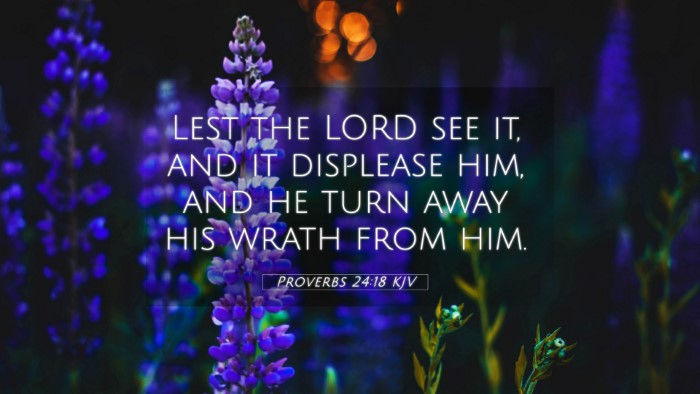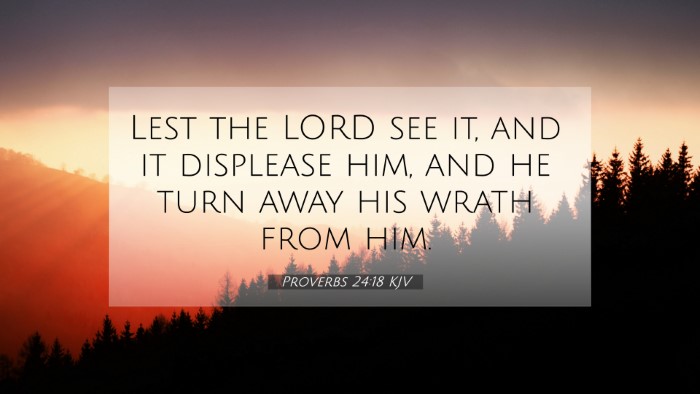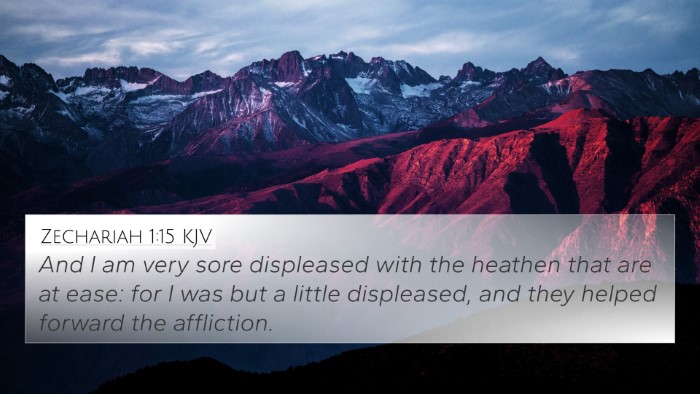Understanding Proverbs 24:18
Proverbs 24:18 states: “Lest the LORD see it, and it displease him, and he turn away his wrath from him.” This verse speaks to the consequences of our moral and ethical choices in the sight of God. Understanding this text calls for a comprehensive look at its implications and connections with other Biblical passages.
Meaning and Interpretation
Public domain commentaries provide valuable insights into the meaning of this proverb. Matthew Henry notes that the text emphasizes God’s watchfulness over human actions and the potential for divine displeasure as a result of wrongful conduct.
Albert Barnes expands on this by suggesting that human injustice, if allowed to flourish unchecked, can lead to divine intervention. He points out that this verse serves as a warning against complacency in moral failings.
Adam Clarke observes that the importance of recognizing the impacts of our actions not only on ourselves but also on the wider community is vital. He suggests that our decisions have consequences that may provoke God's wrath, hence the necessity for ethical living.
Cross-Referencing Biblical Texts
This verse can be cross-referenced with several others that focus on related themes:
- Proverbs 1:7: "The fear of the LORD is the beginning of knowledge: but fools despise wisdom and instruction." This emphasizes the respect and reverence needed before God.
- James 1:15: "Then when lust hath conceived, it bringeth forth sin: and sin, when it is finished, bringeth forth death." This highlights the ultimate consequence of allowing wrongdoing to proliferate.
- Galatians 6:7: "Be not deceived; God is not mocked: for whatsoever a man soweth, that shall he also reap." This is a stark reminder of the reaping of consequences linked to our actions.
- Psalm 7:11: "God judgeth the righteous, and God is angry with the wicked every day." This reinforces the concept of God’s ongoing evaluation of human conduct.
- Proverbs 15:3: "The eyes of the LORD are in every place, beholding the evil and the good." This verse parallels the idea of divine oversight and judgment.
- Hebrews 10:31: "It is a fearful thing to fall into the hands of the living God." It stresses the importance of living in accordance with God’s will to avoid His wrath.
- Romans 2:6: "Who will render to every man according to his deeds." This brings a New Testament perspective into the existing discussion regarding consequences.
Thematic Connections
The themes present in Proverbs 24:18 resonate throughout the Bible, emphasizing the moral responsibility believers have to act justly. The interconnectedness of scripture offers a rich tapestry through which to explore and reinforce the teachings found in Proverbs.
Comparative Bible Verse Analysis
By conducting a comparative analysis of these related Bible verses, readers can deepen their understanding of God's expectations for just living. This practice helps identify connections between the Old and New Testament, thereby enriching one's study and application of Biblical principles.
Tools for Bible Cross-Referencing
Utilizing a Bible concordance or a Bible cross-reference guide can greatly enhance one’s study experience. These tools help navigate through Scripture and uncover connections, thereby facilitating a more comprehensive grasp of Biblical teachings.
Conclusion
In summary, Proverbs 24:18 serves as a poignant reminder of the gravity of our actions in the sight of God. Through diligent study and the use of cross-referencing methods, believers can uncover deeper insights into God's will, as expressed through scripture. Recognizing the inter-Biblical dialogue on morality and consequences encourages a heart posture aligned with righteousness.




